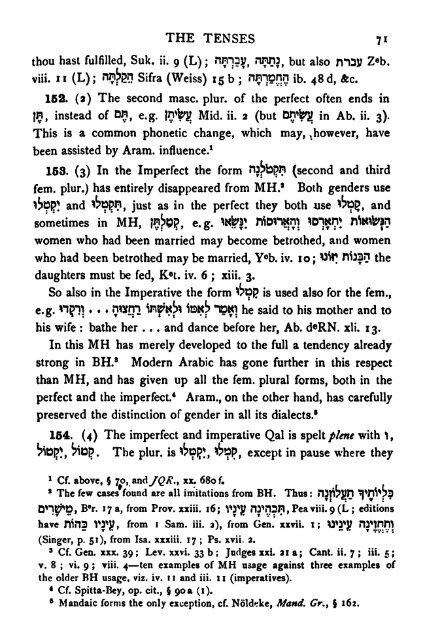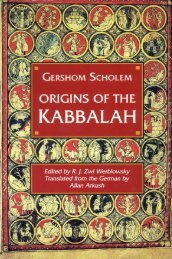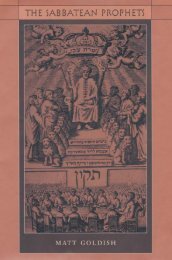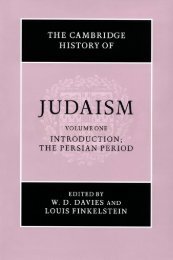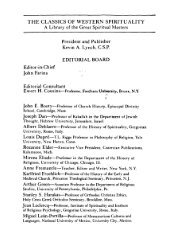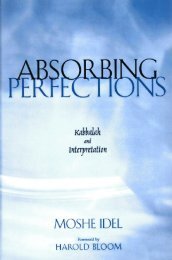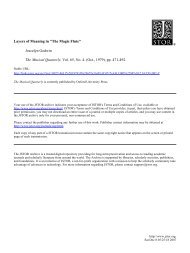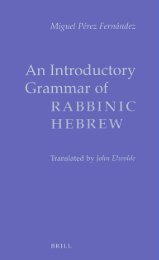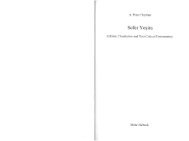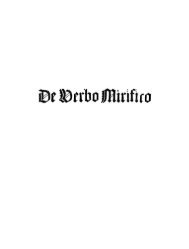A Grammar of Mishnaic Hebrew
A Grammar of Mishnaic Hebrew
A Grammar of Mishnaic Hebrew
Create successful ePaper yourself
Turn your PDF publications into a flip-book with our unique Google optimized e-Paper software.
THE TENSES li<br />
thou hast fulfilled, Suk. ii. 9 (L); nri-jDy, nrinj, but also nnay Z^b.<br />
viii. II (L); nnbgn Sifra (Weiss) 15 b ; nn-jpnn ib. 48 d, &c.<br />
162. (a) The second masc. plur. <strong>of</strong> the perfect <strong>of</strong>ten ends in<br />
|n, instead <strong>of</strong> Df), e.g. in^bg Mid. ii. 2 (but ^""W in Ab. ii. 3).<br />
This is a common phonetic change, which may, ^however, have<br />
been assisted by Aram, influence.*<br />
163. (3) In the Imperfect the form Hjbbpn (second and third<br />
fem. plur.) has entirely disappeared from MH.* Both genders use<br />
^b^P) and ^^tpPJ?, just as in the perfect they both use ^^05, and<br />
sometimes in MH, inb^P, e.g. iNfc'l^ T^Sorm] ^D-JKn; rfwto<br />
women who had been married may become betrothed, and women<br />
who had been betrothed may be married, Y^b. iv. 10; T\mn the<br />
daughters must be fed, K^t. iv. 6 ; xiii. 3.<br />
So also in the Imperative the form >hcj> is used also for the fem.,<br />
e.g. • • • IJ^^tn i^f Smh npKI he said to his mother and to<br />
his wife : bathe her ... and dance before her, Ab. d^RN. xli. 13.<br />
In this MH has merely developed to the full a tendency already<br />
strong in BH.' Modern Arabic has gone further in this respect<br />
than MH, and has given up all the fem. plural forms, both in the<br />
perfect and the imperfect.* Aram., on the other hand, has carefully<br />
preserved the distinction <strong>of</strong> gender in all its dialects."<br />
164. (4) The imperfect and imperative Qal is spelt plme with 1,<br />
i>top\ hSVip. The plur. is 'hoj>\ ^^?P, except in pause where they<br />
1 Cf. above, $ 70, and /Q/H., xx. 680 f.<br />
* The few cases found are all imitations from BH. Thus: njpgn I^H^^p?<br />
Dn^O, B«r. 17 a, from Prov. xxiii. 16; nj^nSPI, Pea viii. 9 (L ; editions<br />
have nin? Vrjf, from i Sam. iii. a), from Gen.* xxvii. i; ^^J^j; HJ^nni<br />
(Singer, p. 51), from Isa. xxxiii. 17 ; Ps. xvii. 2.<br />
' Cf. Gen. xxx. 39; Lev. xxvi. 33 b; Judges xxi. 21a; Cant. ii. 7 ; iii. 5 ;<br />
v. 8 ; vi. 9 ; viii. 4—ten examples <strong>of</strong> MH usage against three examples <strong>of</strong><br />
the older BH usage, viz. iv. 11 and iii. 11 (imperatives).<br />
* Cf. Spitta-Bey, op. cit., § 90a (1).<br />
Mandaic forms the only exception, cf. Noldeke, Afand, Gr,, $ 162.


